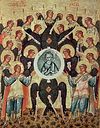

| Previous day | Next day |
| Old Style
September 6
|
Tuesday |
New Style
September 19
|
| 16th Week after Pentecost. Tone 6. | No fast.
|
![]() Commemoration of the Miracle of the Archangel Michael at Colossae (Chonae) (4th c.).
Commemoration of the Miracle of the Archangel Michael at Colossae (Chonae) (4th c.). ![]() Martyr Eudoxius, and with him Martyrs Zeno, Macarius, and 1,104 soldiers, in Melitene (311-312).
Martyr Eudoxius, and with him Martyrs Zeno, Macarius, and 1,104 soldiers, in Melitene (311-312).
Martyrs Romulus and 11,000 others, in Armenia (ca. 107-115). St. Archippus of Hierapolis (4th c.). Martyrs Cyriacus, Faustus, Abibus, and 11 others, at Alexandria (250). Hieromartyr Cyril, bishop of Gortyna on Crete (ca. 303). St. David of Hermopolis in Egypt (6th c.).
Icon of the Mother of God of Kiev-Bratsk (1654). Icon of the Mother of God Arapet (Arabian).
Martyrs Calodote, Macarius, Andrew, Cyriacus, Dionysius, Andrew the Soldier, Andropelagia, Thecla, Theoctistus, and Sarapabon the Senator, in Egypt (256). St. Beya, virgin, first abbess of Copeland in Cumbria (7th c.). St. Magnus of Fussen, enlightener of the Allgau region of Germany (750-772).
Repose of Ivan Yakovlevich Koreisha, fool-for-Christ, of Moscow (1861), and Archimandrite Paisius the New, of Mt. Athos (1871).
Thoughts for Each Day of the Year
According to the Daily Church Readings from the Word of God
By St. Theophan the Recluse

Tuesday. [Gal. 5:11-21; Mark 7:5-16]
There is nothing from without a man, that entering into him can defile him: but the things which come out of him, those are they that defile the man. This and similar passages, for example: But meat commendeth us not to God (1 Cor. 8:8) are usually cited by those who do not like to fast, supposing that they thereby sufficiently justify their not fasting according to the rule and custom of the Church. The validity of this excuse is known to everyone faithful to the Church. The fast decrees that we abstain from some foods not because they are defiled, but because we can more conveniently refine our flesh by this abstinence—something crucial for inner progress. This meaning of the law of fasting is so essential that those who consider some foods to be defiled are numbered among the heretics. Those who do not like to fast would do better not dwell on this point, but on the point that fasting is not obligatory, although it definitely is a means for overcoming sinful urges and the strivings of the flesh. But they can in no way stand their ground on this point, either. If inner progress is obligatory, then the means by which it is obtained is also obligatory, namely, fasting. Each person’s conscience says this to him. In order to soothe their conscience, they assert: I will compensate for my omission of fasting in another way; or, fasting is harmful for me; or, I will fast when I want to, and not during the established fasts. However, the first excuse is inappropriate because nobody has yet managed without fasting to cope with his flesh, or order his inner life properly. The last excuse is also inappropriate, because the Church is one body, and to separate oneself from others in it means opposing its construction. One can remove oneself from the general customs of the Church only by leaving it; but while someone is a member of it, he cannot say this and demand that. The second excuse has a shadow of a right. Indeed, among the limitations of fasting the obligation is lifted from those for whom fasting acts destructively, because the fast was established not to kill the body, but to mortify the passions. But if one should conscientiously count the true number of such people it would be seen that they are so few that they do not even count. Only one real reason remains—lack of desire. There is no point in debating with this. You will neither be brought to heaven against your will; only when you are condemned to hell you will go whether you want to or not—they will grab you and fling you there.
Articles
 Icon of the Mother of God Arapet (Arabian)The Arapet, or “Arabian” Icon of the Most Holy Theotokos appeared while the holy Apostle Thomas was evangelizing Ethiopia, Arabia, and India. |








